Blockchain Use Cases in 2025 Across Industries
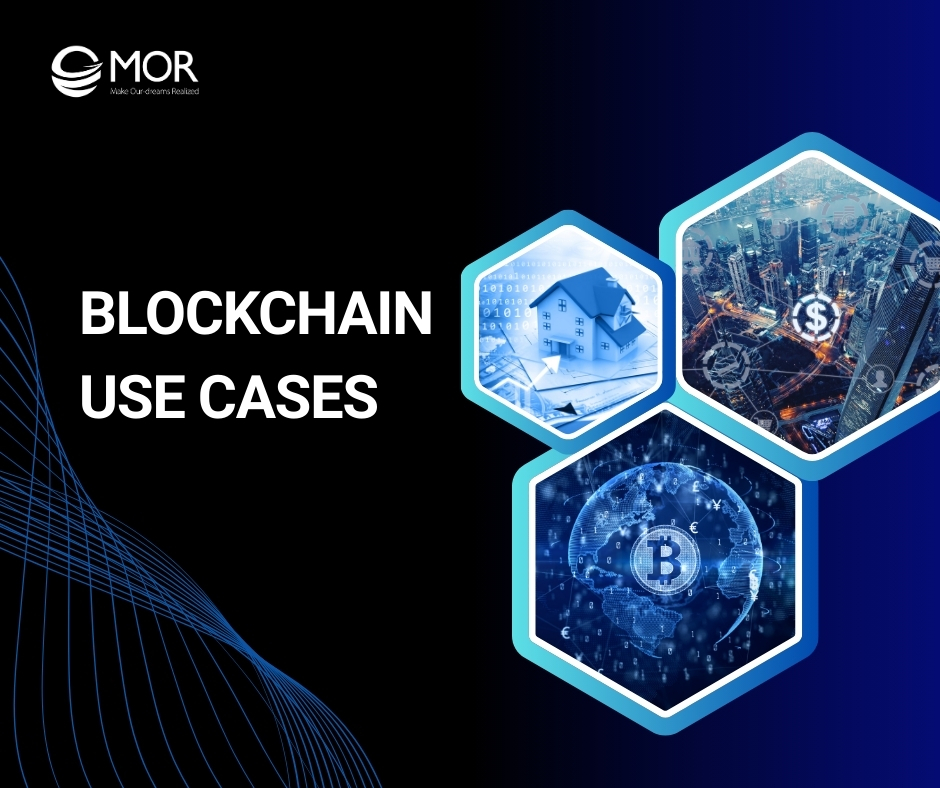
Businesses worldwide are exploring new opportunities with blockchain use cases, from finance to healthcare and beyond. Yet many still struggle to identify the most practical use cases for blockchain that deliver real value. In this guide, MOR Software highlights the top 2025 blockchain applications and how they are reshaping industries.
What Is A Blockchain?
A blockchain is a type of distributed ledger shared across many computers in a network. It is most often linked with cryptocurrency, where it records transactions in a decentralized and secure way. Yet the technology goes far beyond digital money. Today, blockchain use cases stretch into finance, supply chains, healthcare, and more, because it creates records that are permanent and tamper-proof.
Once a block of data is written, it cannot be changed. The only trust required is at the point where data is entered. This design cuts down the reliance on outside verifiers or auditors, who can be costly and prone to errors. That reliability has made the application of blockchain technology attractive to industries that depend on transparency.
Since the launch of Bitcoin in 2009, interest in blockchain has grown rapidly. It is now the backbone for decentralized finance (DeFi), smart contracts, and NFTs. Cryptocurrencies like Bitcoin, Ethereum, and Solana continue to drive awareness, while more organizations are exploring practical business models tied to blockchain use cases worldwide.
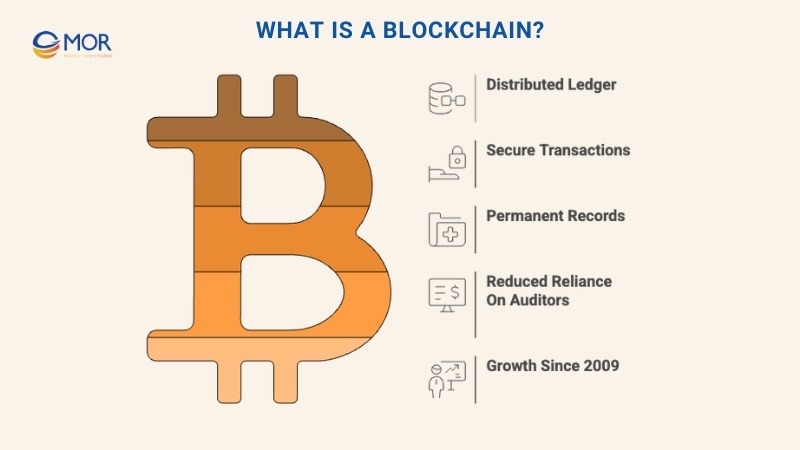
How Does Blockchain Work?
Blockchain functions on principles that guarantee transparency, security, and decentralization. At its core, the system relies on linked blocks that build a trusted chain of records. To understand use cases for blockchain, it helps to see how each part works together.
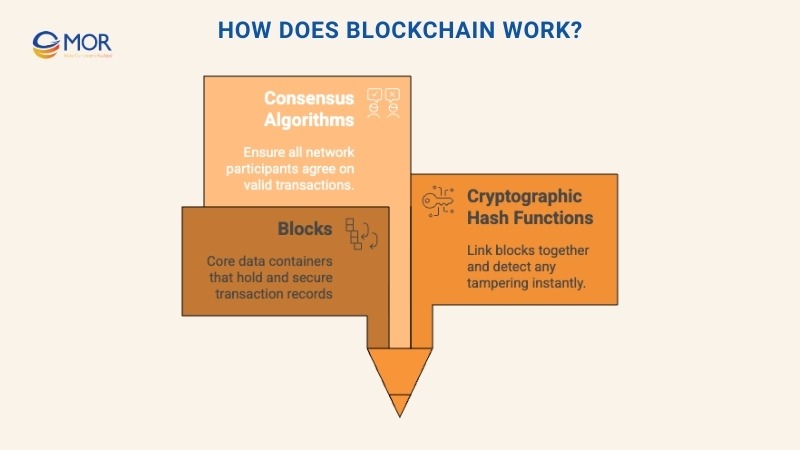
Blocks
Blocks act as the core data containers in the system, forming the essential units of the ledger. Each block records a group of transactions and is stamped with a unique identifier called a hash.
This hash is produced through complex cryptography and works like a fingerprint tied to the block’s content. It secures the data, labels the block, and ensures the sequence of information remains intact. This design allows industries to apply blockchain for processes where accuracy and trust are mandatory.
Cryptographic Hash Functions
The chain between blocks is held together by cryptographic hash functions that lock in the ledger’s integrity.
Every block’s hash embeds data from itself and the previous block, making the chain resistant to alteration. If any detail is changed, the hash updates immediately, and the network detects the issue. This built-in safeguard alerts participants to tampering attempts, protecting blockchain use cases that depend on reliable and secure transactions.
Consensus Algorithms
Consensus algorithms make sure every participant in a blockchain network agrees on the validity of transactions. They safeguard the ledger and keep the system consistent.
The most widely recognized models are Proof of Work (PoW) and Proof of Stake (PoS). PoW relies on miners solving complex puzzles to add blocks, a process tied closely to blockchain bitcoin systems. PoS, on the other hand, allows validators to confirm transactions based on the amount of cryptocurrency they hold, which helps maintain fairness and network stability. These methods provide the foundation for reliable blockchain use cases across industries.
Top Blockchain Use Cases In Different Industries
The most impactful blockchain use cases go far beyond cryptocurrency. Industries from finance to healthcare are applying the technology to solve long-standing problems and unlock new opportunities.
Financial Services
The financial services industry has seen some of the most impactful blockchain use cases to date. The technology has removed long-standing inefficiencies, enabling faster innovation and reducing costs. Its role as a decentralized ledger has changed how institutions handle money, creating transactions that are quicker, more transparent, and less expensive than traditional methods.
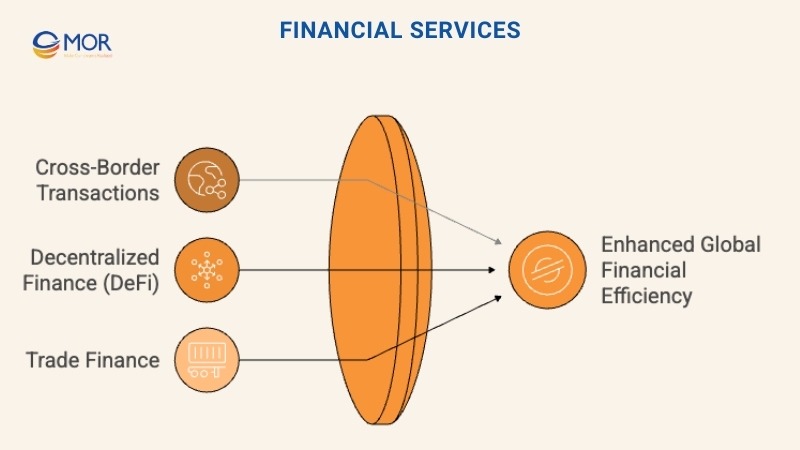
Cross-Border Transactions
International payments once required several days and multiple middlemen, often with steep fees. With blockchain, those hurdles disappear. Decentralized systems enable direct peer-to-peer transfers across countries, lowering costs and saving time. Platforms like Ripple (XRP) showcase how settlement speed has shifted from days to just seconds, driving global commerce forward. Tools like a btc block explorer also highlight how transparent and trackable these payments can be in practice.
Decentralized Finance (DeFi)
Among the most disruptive use cases of blockchain is decentralized finance, known as DeFi. These platforms replace banks with smart contracts, letting users borrow, lend, or trade without middlemen. Projects like Aave and Compound have shown how automated contracts guarantee secure execution, while expanding access to financial tools for people traditionally left out of the banking system. This part of the blockchain ecosystem continues to grow rapidly and reshape trust in financial services.
Trade Finance
Trade finance is another area where blockchain use cases shine. International trade often suffers from disputes and delays caused by paper-heavy processes and multiple stakeholders. Distributed ledgers fix this by creating a single, tamper-proof record for all parties involved.
Networks like Marco Polo and we.trade provide digital systems that automate compliance, improve transparency, and unlock liquidity. These solutions simplify operations and reduce risk across global supply chains, proving how blockchain can redefine business trust worldwide.
Blockchain Use Cases In Supply Chain Management
Blockchain is reshaping supply chain management by tackling long-standing issues like limited visibility, inefficiencies, and the spread of counterfeit goods.
Through its decentralized and tamper-proof ledger, the technology gives every stakeholder access to a shared, reliable record, strengthening trust and improving overall efficiency across the chain.
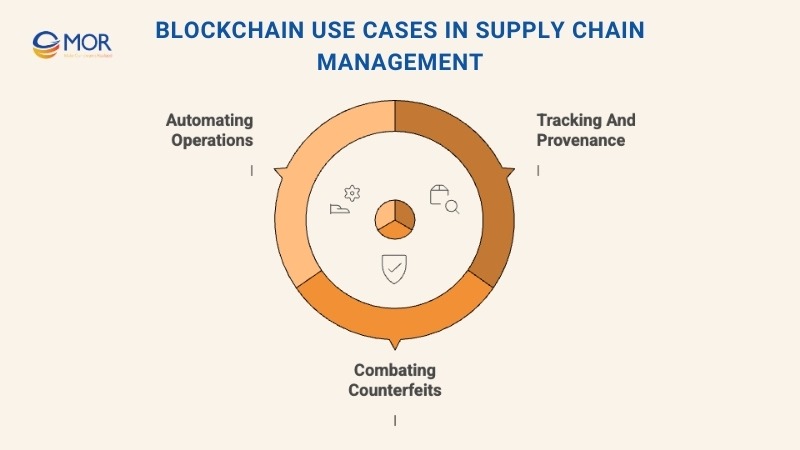
Tracking And Provenance
Supply chains have long faced issues with inefficiency, lack of visibility, and fraud. Some of the strongest blockchain supply chain use cases address these challenges directly. Through offering a decentralized and tamper-proof record, blockchain creates a single version of truth shared by all parties, improving efficiency and trust across the chain.
Product traceability has become vital for sectors like food, medicine, and high-value goods. Blockchain enables real-time tracking of an item’s journey from source to consumer, cutting trace times from weeks to seconds. IBM Food Trust demonstrates how uses of the blockchain help reduce risks of foodborne illnesses and recalls, while also raising consumer confidence.
Combating Counterfeits
Fake goods remain a costly issue in industries from fashion to pharmaceuticals. Blockchain offers a solution by assigning every item a digital identity that cannot be altered. Platforms such as VeChain already apply this method to verify authenticity, letting businesses and consumers confirm products are genuine. This prevents revenue losses, strengthens brand reputation, and shows how critical blockchain use cases are in protecting markets.
Automating Operations
Traditional supply chains involve layers of paperwork and slow approvals. With smart contracts, agreements are executed instantly once conditions are met, removing delays and human error. Blockchain platforms can also connect with IoT devices to monitor details like location and storage conditions, giving managers more control. These improvements not only cut costs but also encourage sustainable and ethical practices by revealing sourcing details.
Enterprises adopting these blockchain use cases gain stronger operations and a competitive edge, especially as buyers demand more responsible supply chains.
Healthcare Blockchain Use Cases
Healthcare continues to struggle with rising concerns around data security, fragmented systems, and inefficiencies in daily operations. Blockchain addresses these challenges by enabling safe data exchange, stronger privacy, and more streamlined processes across the entire healthcare ecosystem.
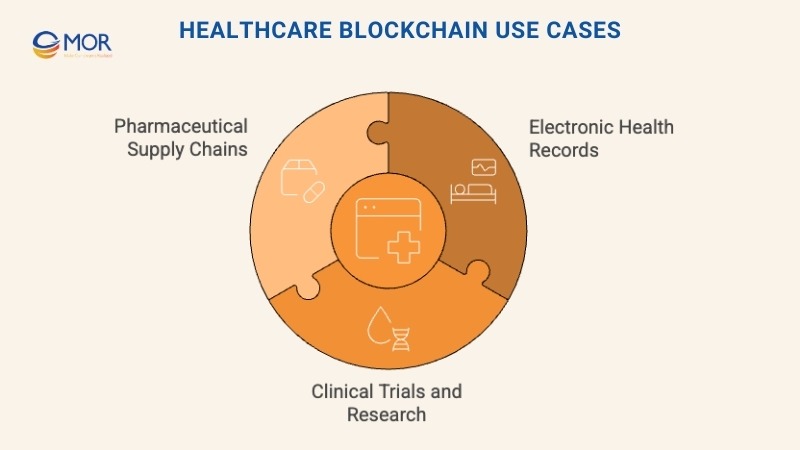
Electronic Health Records (EHRs)
Healthcare providers struggle with fragmented systems that often lead to mistakes and inefficiencies. One of the strongest blockchain use cases is electronic health record management. A decentralized ledger lets patient data be securely stored and only accessed by authorized parties.
Platforms like Medicalchain allow patients to control their own medical data while giving healthcare professionals secure access when required. This protects data integrity, reduces duplication, and ensures providers have accurate records when treating patients. These use cases blockchain highlight how better care coordination becomes possible with trusted data.
Clinical Trials And Research
Research and clinical trials demand transparency and accuracy. The application of blockchain technology provides an immutable record for trial information, participant consent, and results. This ensures that studies comply with strict regulations and prevents manipulation of findings.
Pharmaceutical firms including Pfizer have tested blockchain in this area to simplify trials and guarantee that all stakeholders access a single, tamper-proof version of the truth. Such adoption strengthens trust in medical research worldwide.
Pharmaceutical Supply Chains
Counterfeit drugs remain a danger to global health. Blockchain helps protect patients by enabling full traceability of medicines from production to sale. Platforms like MediLedger are already being applied to combat this issue.
When blockchain integrates with IoT devices, companies can track temperature and storage conditions during transit. This ensures quality, compliance, and consumer safety. These practical blockchain use cases not only reduce risks but also encourage innovation in services like decentralized health insurance and data-driven care.
The steady adoption of blockchain in healthcare will deliver stronger security, higher efficiency, and better trust between patients, providers, and researchers.
Real Estate Applications
Blockchain is redefining real estate by bringing greater transparency, stronger security, and improved efficiency to property transactions.
Instead of relying on layers of intermediaries, heavy paperwork, and long delays, blockchain simplifies deals with a decentralized and tamper-proof ledger that keeps every record accurate and accessible.
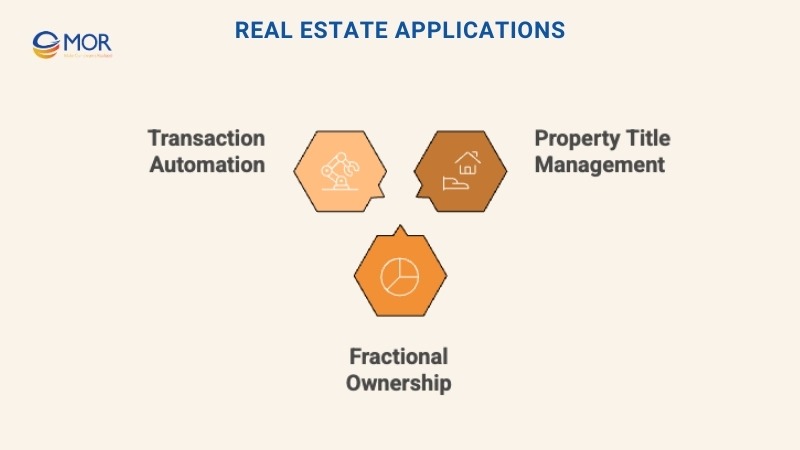
Property Title Management
Real estate has long been slowed down by paperwork, intermediaries, and disputes. Some of the clearest blockchain use cases are now addressing these pain points. Property title management is a prime example, where blockchain secures ownership records on a distributed ledger.
With this system, property data remains transparent and unalterable, reducing fraud and errors. This is especially valuable in areas where traditional record-keeping is unreliable. Platforms like Propy lead the way by giving buyers and sellers confidence in verified digital title records.
Fractional Ownership
Real estate investing is often limited to those with significant capital. By allowing fractional ownership, blockchain opens the door to smaller investors who can purchase shares of properties rather than full ownership.
This model increases liquidity and lowers entry barriers, creating new opportunities in the market. Tokenization platforms like RealT show how investors can apply blockchain to diversify portfolios securely, proving the strength of these blockchain use cases in finance and property alike.
Transaction Automation
Property deals are often delayed by negotiations, escrow services, and contract checks. With smart contracts, agreements are executed automatically once all terms are met. This reduces costs, minimizes errors, and accelerates sales.
The same approach supports cross-border real estate deals, giving every party access to a shared and trustworthy record. These innovations also hint at blockchain and AI use cases in property markets, where smart automation could bring even greater accuracy and speed.
Blockchain is setting a new benchmark for efficiency in real estate, offering practical solutions for both investors and owners while driving fresh opportunities for growth.
Identity And Access Management
In today’s connected world, digital identity management is more important than ever. Conventional systems remain exposed to breaches and identity theft, while blockchain delivers a decentralized and secure way to manage identities, giving both individuals and organizations stronger control over their personal data.
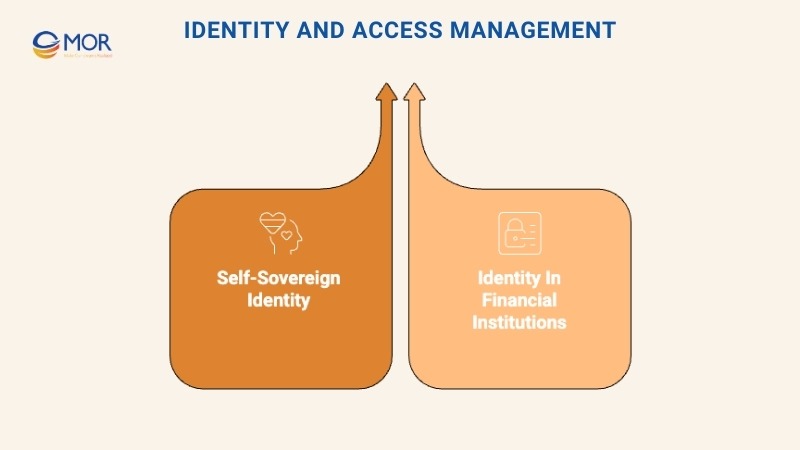
Self-Sovereign Identity
In a connected world, managing digital identity has become a pressing challenge. Traditional systems remain prone to breaches and identity theft, but some of the most valuable blockchain use cases solve these risks with decentralized control. The idea of self-sovereign identity allows individuals to fully own and manage their digital profiles.
Rather than depending on centralized databases, people can store credentials on a blockchain and decide when to share them. Platforms like Civic demonstrate how this works, letting users verify themselves without disclosing sensitive details. This not only minimizes exposure but also grants autonomy, proving how effective blockchain bitcoin principles can be when extended beyond money into identity.
Identity In Financial Institutions
For banks and other financial institutions, identity verification is essential but often slowed down by compliance burdens and redundant checks. Blockchain introduces secure, verifiable identity systems that simplify Know Your Customer (KYC) and Anti-Money Laundering (AML) processes.
With decentralized records, institutions reduce dependency on intermediaries, protect against tampering, and improve data accuracy across onboarding. These blockchain use cases also align with broader regulatory needs, reflecting the same benefits seen in blockchain government use cases, where digital ID systems improve efficiency and security at scale.
As industries embrace stronger verification methods, blockchain sets the stage for a future where identities are transparent, secure, and always under the control of rightful owners.
Blockchain Use Cases In Intellectual Property And Content
Blockchain is transforming the management of intellectual property (IP) and the distribution of digital content. Creators now use it to secure ownership, guarantee fair compensation, and connect directly with their audiences without relying on traditional intermediaries.
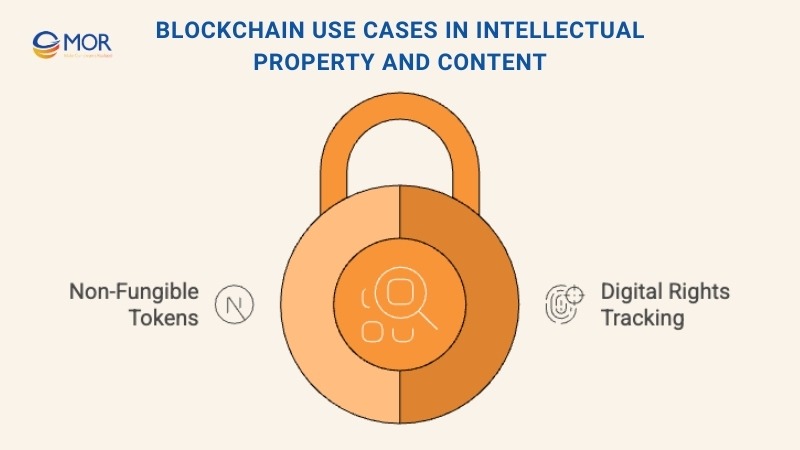
Digital Rights Tracking
One of the most practical blockchain use cases today lies in protecting intellectual property and managing digital rights. By storing ownership records on a decentralized ledger, creators can track how their work is used and ensure proper compensation.
This is especially powerful in industries like music, where royalty systems have historically lacked transparency. Platforms like Audius show how artists can share music directly with fans, bypassing intermediaries and guaranteeing that every play or transaction is accounted for. Just as a btc block explorer allows users to see each cryptocurrency transaction, blockchain makes content usage fully traceable and fair.
Non-Fungible Tokens (NFTs)
The rise of NFTs has reshaped how creators distribute and monetize digital assets. By tokenizing works such as songs, videos, or artwork, creators can sell unique items directly to consumers while keeping a verified chain of ownership.
This innovation has created new revenue streams and fresh ways for audiences to engage with creative work. Beyond art, NFTs are also being applied to intellectual property in gaming, publishing, and other industries. These use cases blockchain highlight how authenticity, ownership, and monetization are evolving in the digital age.
Blockchain continues to redefine the creative economy, providing tools that let creators safeguard their content while unlocking new business models.
Energy Sector Applications
The energy industry is entering a major shift as blockchain creates new methods to decentralize markets, boost transparency, and increase efficiency.
Combining blockchain with smart devices and renewable energy systems, the sector is tackling issues of resource management, fraud, and consumer confidence head-on.
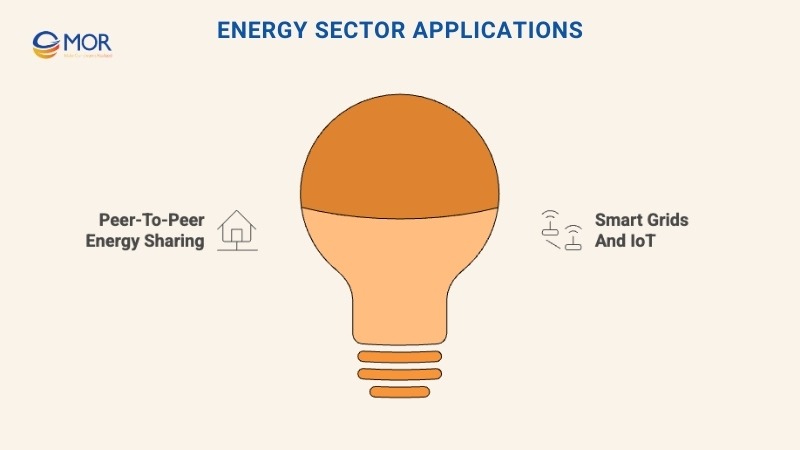
Peer-To-Peer Energy Sharing
The energy industry is shifting toward decentralization, and some of the most promising blockchain use cases are emerging in community-driven trading. Peer-to-peer (P2P) energy sharing allows households with excess solar or wind power to sell directly to their neighbors. This reduces dependency on large utility firms and encourages wider adoption of renewable resources.
Platforms like Powerledger make these exchanges possible by recording every transaction on a secure blockchain ledger. With transparent and tamper-proof records, participants enjoy fair pricing, lower costs, and more equitable access to energy. These examples highlight real-world use cases of blockchain in creating sustainable and community-based energy solutions.
Smart Grids And IoT
Another area where blockchain is advancing energy is through smart grids connected to IoT devices. These grids rely on real-time data to distribute power more efficiently across networks. Blockchain provides the secure infrastructure needed for devices to share accurate consumption and production data without risk of tampering.
This model helps utilities optimize performance, minimize waste, and strengthen resilience against outages. It also makes it easier to integrate renewable energy into existing systems. Applying these blockchain use cases, the energy sector is not only boosting efficiency but also supporting global sustainability targets.
Government And Public Services
Blockchain is fueling major innovations in government and public services by improving transparency, curbing corruption, and simplifying operations.
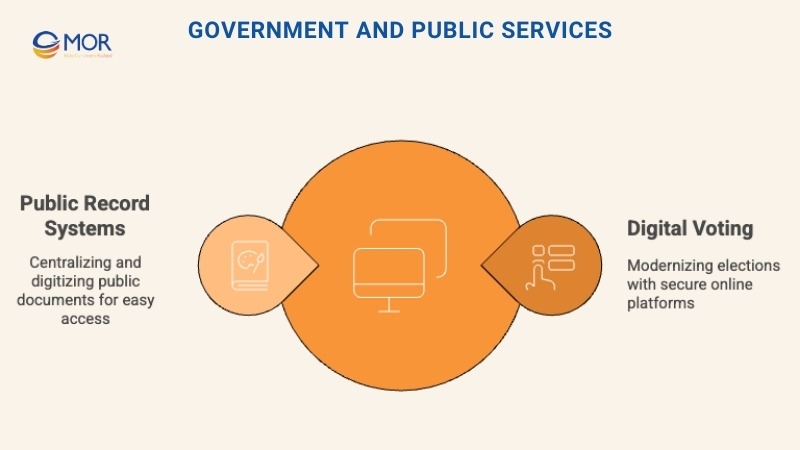
Digital Voting
Governments around the world are exploring blockchain use cases to improve transparency and reduce corruption. One of the most promising areas is voting. By recording votes on a decentralized ledger, blockchain creates an unalterable and verifiable system that protects against fraud and tampering.
Countries like Estonia have already tested blockchain-based voting platforms, proving that citizens can vote securely while verifying their ballots in real time. These systems also expand accessibility for remote voters, building greater trust in democratic processes and highlighting the importance of blockchain government use cases for the future of elections.
Public Record Systems
Managing public records such as land registries, licenses, or birth certificates is often complicated and prone to mistakes or manipulation. Blockchain helps solve this issue by providing a tamper-proof digital ledger where information is permanently stored and easy to access.
Governments like Dubai are adopting blockchain to digitize and secure their public services. This improves efficiency, cuts down bureaucracy, and gives citizens confidence in the accuracy of official data. These advances confirm how governments can apply blockchain to deliver more transparent, reliable, and citizen-focused services.
Emerging Trends And Future Outlook Of Blockchain Use Cases
Blockchain keeps advancing, merging with other emerging technologies to open new opportunities and reshape industries worldwide.
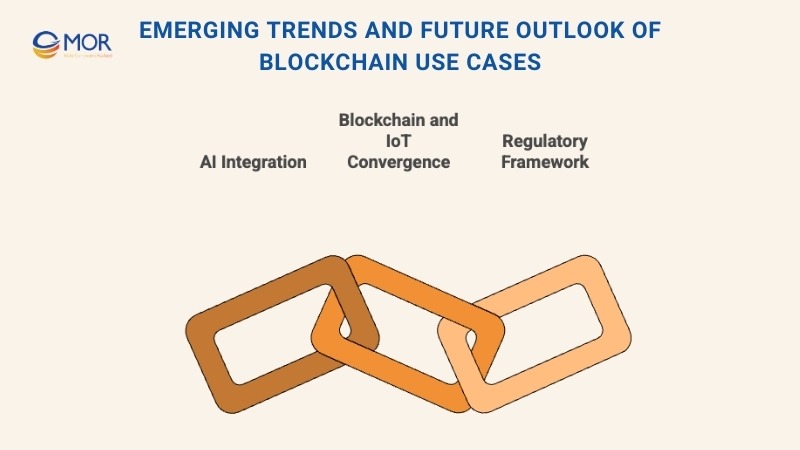
AI Integration
The next wave of blockchain use cases is emerging at the intersection of artificial intelligence and decentralized ledgers. The integration of the two creates secure foundations for storing and sharing data, while AI analyzes that data to generate insights and automate decisions.
This synergy is particularly powerful in finance and healthcare, where accuracy and privacy are critical. These blockchain and AI use cases point to a future where industries can balance trust and intelligence in ways that were not possible before.
Blockchain And IoT
Another trend is the convergence of blockchain with the Internet of Things. By enabling secure and tamper-resistant communication among connected devices, blockchain makes IoT networks safer and more reliable.
Smart city initiatives and advanced supply chain systems are clear examples where real-time monitoring pairs with decentralized ledgers to improve efficiency. These collaborations underline the expanding application of blockchain technology in connected environments worldwide.
Regulations And Global Standards
Governments and regulators are also shaping the future of blockchain use cases. In Europe, the Markets in Crypto-Assets (MiCA) regulation sets a comprehensive framework for digital assets, covering transparency, investor protection, and fair markets.
Similar steps are being taken globally to ensure responsible adoption while promoting innovation. These regulations provide businesses with clearer guidance and help investors trust blockchain-powered solutions. As standards continue to develop, organizations will find it easier to deploy blockchain responsibly at scale.
Develop Your Blockchain Application With MOR Software
Building a blockchain product requires more than just coding. It takes a team that understands token standards, smart contracts, system integration, and industry-specific compliance. At MOR Software, we bring that combination of expertise to every blockchain project.
Our engineers have delivered solutions across finance, healthcare, supply chain, real estate, and digital identity. From designing tokenomics to integrating blockchain with mobile or web applications, we ensure your product is not only functional but also scalable and secure. With ISO 9001:2015 and ISO 27001:2013 certifications, security and quality are baked into our development process from day one.
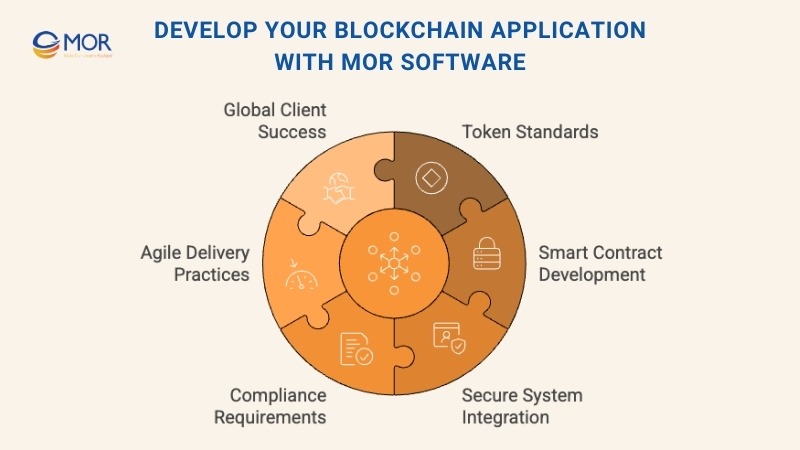
We apply Agile and Scrum practices, allowing fast delivery and continuous improvement. Whether you’re looking to launch a DeFi platform, a blockchain-powered supply chain system, or a digital identity solution, our teams guide you through each stage: analysis, design, development, QA, and long-term support.
Our track record includes projects for leading enterprises in Japan, Vietnam, and beyond, ranging from healthcare systems with blockchain-based data integrity to large-scale financial integrations. Clients trust us because we combine technical depth with a strong understanding of business requirements.
Partnering with MOR means more than outsourcing. It means having a dedicated partner focused on making your blockchain application practical, future-ready, and aligned with your growth goals.
Conclusion
Blockchain is no longer an experiment. Its real-world adoption is accelerating across finance, healthcare, supply chains, government, and more. As these blockchain use cases expand, businesses that act now will secure a strong competitive edge in 2025 and beyond. MOR Software has the expertise to turn ideas into secure, scalable solutions that deliver lasting value. Ready to explore your blockchain project? Contact us today to start building with confidence.
Rate this article
0
over 5.0 based on 0 reviews
Your rating on this news:
Name
*Email
*Write your comment
*Send your comment
1